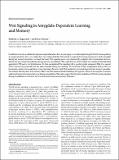| dc.contributor.author | Maguschak, Kimberly A. | |
| dc.contributor.author | Ressler, Kerry J. | |
| dc.date.accessioned | 2012-05-31T18:49:42Z | |
| dc.date.available | 2012-05-31T18:49:42Z | |
| dc.date.issued | 2011-09 | |
| dc.date.submitted | 2011-06 | |
| dc.identifier.issn | 0270-6474 | |
| dc.identifier.uri | http://hdl.handle.net/1721.1/70965 | |
| dc.description.abstract | In addition to its role in cellular development and proliferation, there are emerging in vitro data implicating the Wnt/β-catenin pathway in synaptic plasticity. Yet in vivo studies have not examined whether Wnt activity is required for learning and memory. In the amygdala during fear memory formation, we found that many Wnt-signaling genes were dynamically regulated, with an immediate decrease, followed by an eventual normalization during memory consolidation. This rapid decrease in Wnt mRNA was confirmed with individual quantitative PCR and in situ hybridization. We then manipulated Wnt signaling with a specific peptide antagonist (Dkk-1) or agonist (Wnt1) injected stereotaxically into the adult amygdala during fear learning. We found that neither manipulation had an effect on locomotion, anxiety, fear acquisition, or fear expression. However, both Wnt modulators prevented long-term fear memory consolidation without affecting short-term memory. Dkk-1 and Wnt infusions had destabilizing, but opposite, effects on the requisite β-catenin/cadherin dynamic interactions that occur during consolidation. These data suggest that dynamic modulation of Wnt/β-catenin signaling during consolidation is critical for the structural basis of long-term memory formation. | en_US |
| dc.description.sponsorship | Burroughs Wellcome Fund | en_US |
| dc.description.sponsorship | National Institutes of Health (U.S.) (DA019624) | en_US |
| dc.description.sponsorship | National Institutes of Health (U.S.) (P30 NS055077) | en_US |
| dc.description.sponsorship | National Science Foundation (U.S.) (GRFP DGE-0234618) | en_US |
| dc.description.sponsorship | National Science Foundation (U.S.) (Center for Behavioral Neuroscience, Agreement #IBN-9876754) | en_US |
| dc.description.sponsorship | National Institutes of Health (U.S.) (National Primate Research Center Base Grant, #RR-00165) | en_US |
| dc.description.sponsorship | National Institutes of Health (U.S.) (Animal Resource Program) | en_US |
| dc.language.iso | en_US | |
| dc.publisher | Society for Neuroscience | en_US |
| dc.relation.isversionof | http://dx.doi.org/10.1523/jneurosci.3248-11.2011 | en_US |
| dc.rights | Article is made available in accordance with the publisher's policy and may be subject to US copyright law. Please refer to the publisher's site for terms of use. | en_US |
| dc.source | SFN | en_US |
| dc.title | Wnt Signaling in Amygdala-Dependent Learning and Memory | en_US |
| dc.type | Article | en_US |
| dc.identifier.citation | Maguschak, K. A., and K. J. Ressler. “Wnt Signaling in Amygdala-Dependent Learning and Memory.” Journal of Neuroscience 31.37 (2011): 13057–13067. Web. | en_US |
| dc.contributor.department | Massachusetts Institute of Technology. Department of Brain and Cognitive Sciences | en_US |
| dc.contributor.approver | Maguschak, Kimberly A. | |
| dc.contributor.mitauthor | Maguschak, Kimberly A. | |
| dc.relation.journal | Journal of Neuroscience | en_US |
| dc.eprint.version | Final published version | en_US |
| dc.type.uri | http://purl.org/eprint/type/JournalArticle | en_US |
| eprint.status | http://purl.org/eprint/status/PeerReviewed | en_US |
| dspace.orderedauthors | Maguschak, K. A.; Ressler, K. J. | en |
| mit.license | PUBLISHER_POLICY | en_US |
| mit.metadata.status | Complete | |
